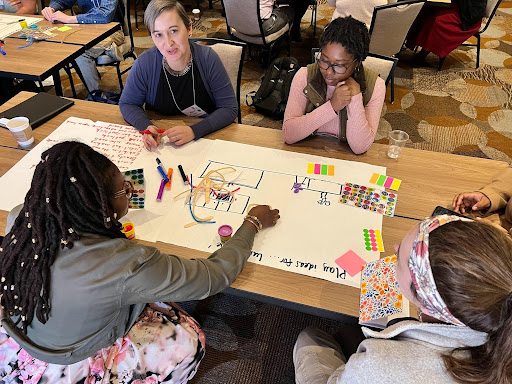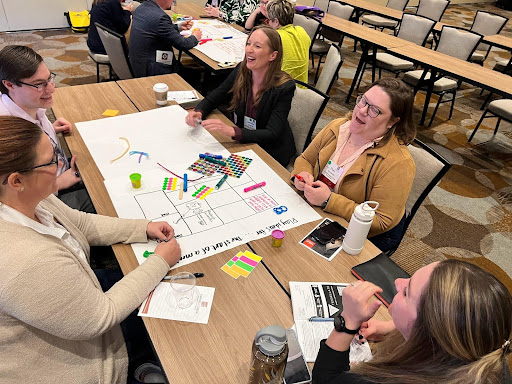Does Your Museum Team Need More Play? - OMA 2024 Conference Session Follow-Up
The following is a follow-up to the OMA 2024 Annual Conference session, Developing a Stronger, More Creative Team Through Play, presented by Tricia O'Connor and Charity Counts.
Didn't get a chance to attend this session, but want to learn more about the topic? Did you attend the session and are eager to see the results of the group brainstorm? Check out the great article below for more insights!
By: Tricia O'Connor, play advocate and exhibit consultant, and Charity Counts, executive director of the Association of Midwest Museums
 Are you witnessing burnout among your museum team members, noticing that they aren’t working well together, or having trouble motivating young adult employees? We believe part of the answer is play … for grownups!
Are you witnessing burnout among your museum team members, noticing that they aren’t working well together, or having trouble motivating young adult employees? We believe part of the answer is play … for grownups!
Play isn’t just for kids, but childhood is where we first develop our play skills. As children, we learn about the world and develop essential life skills in the most fun way imaginable—play. Depending on the kind of play we experienced, from self-directed to adult-directed, we learned how to communicate ideas, solve problems, resolve conflicts, take risks, be creative, and see the world through another’s eyes. Yet, not everyone’s play experience was the same and, for a variety of reasons, some kids may have experienced little to no independent or child-directed play time at all.
Why does this matter?
During our session at the recent Ohio Museums Association Conference (Developing a Stronger, More Creative Team Through Play), we shared that since the 1960s, the US and other countries have experienced two disturbing trends: the decline of child-directed play and the rise of child and teen mental health issues. Later, in the isolation and lack of personal connection that resulted from a global pandemic, our youngest generations entering the workforce have had even more limited opportunities to build those essential skills often first developed through childhood play. As young adults face concerns about mental health and struggle to recover from the pandemic, they may also struggle with emotional regulation, conflict negotiation, and the willingness or ability to see things from different perspectives.
Coincidentally, these are all symptoms of play deprivation, and we believe employers can address these gaps in skills development and support creativity for their staff members by introducing more play time into the work day.
Play is important for the well-being of grownups. In addition to being essential for health and wellbeing, play can foster empathy and promote a sense of belonging, something that is dearly needed given the isolation and loneliness many experienced during the pandemic. It can also help teams generate cross-generational bonding as well as lead to creative solutions for museum experiences and operations.
During our session, we shared how play was incorporated into our own museum work and positively affected us as museum workers. We then invited attendees to brainstorm ideas for incorporating play into common work settings: the start of virtual and in-person meetings, at lunchtime, and over a longer window of time. Here are some of their ideas:

Play ideas for the start of an in-person meeting:
- Musical chairs
- Sing or play camp songs
- Show-and-tell
- Doodle paper at the meeting table
- Start with a Pictionary, Cranium or Trivia prompt
- Tell a “dad” joke
- Play “silent library” with silly acting prompts
- Set up a Hot Wheels track and take turns launching cars
- Healthy drinking game (i.e. kale juice) around a secret word
- Draw a monster that represents your stress task
- Sock puppets!
- Pictionary
- Have someone secretly draw on the whiteboard and everyone guess who
- Slime time!
Play ideas for the start of a virtual meeting:
- Tell a dad joke
- Zoom pranks
- Play the game of “telephone”
- Build a quick LEGO sculpture and share it
- Share a funny meme or photo
- Hot potato!
- Bracket madness but with silly topics - best potato, etc.
- Playdough sculptures
- Make your own meme
- Pictionary
- Chubby bunny challenge - stuff marshmallows into your cheeks!
- Draw your fear of what will happen if we waste time on a play activity (Oof! Getting right to the heart of the culture shift challenge with this one!)
Play ideas for lunchtime:
- Lunch show-and-tell
- Have an inside picnic
- Potato bar potluck
- Fridge meme board
- “Try not to eat” contest - first one to give into temptation loses!
- Board game/card game
- Cookie frosting party
- Choose your own adventure "surprise lunch"
- Dessert potluck
- Tinfoil hat making
- S’mores with a solar oven
Play for longer windows of time:
- Do program activities – with staff!
- Go to an escape room – or go bowling
- Hold an impromptu white elephant (grab something from your office to give)
- Museum dance
- Start a new trend!
- Build something with partners/teams
- End of year slideshow
- Make a collage
- Paint your peer, partner, teammate
- Make a stop-motion animated video
- Bring your favorite board game to work day
The main point? Have fun with it! After all, we’re talking about play!
If you are looking for additional session resources from OMA 2024, be sure to visit the session resources page!